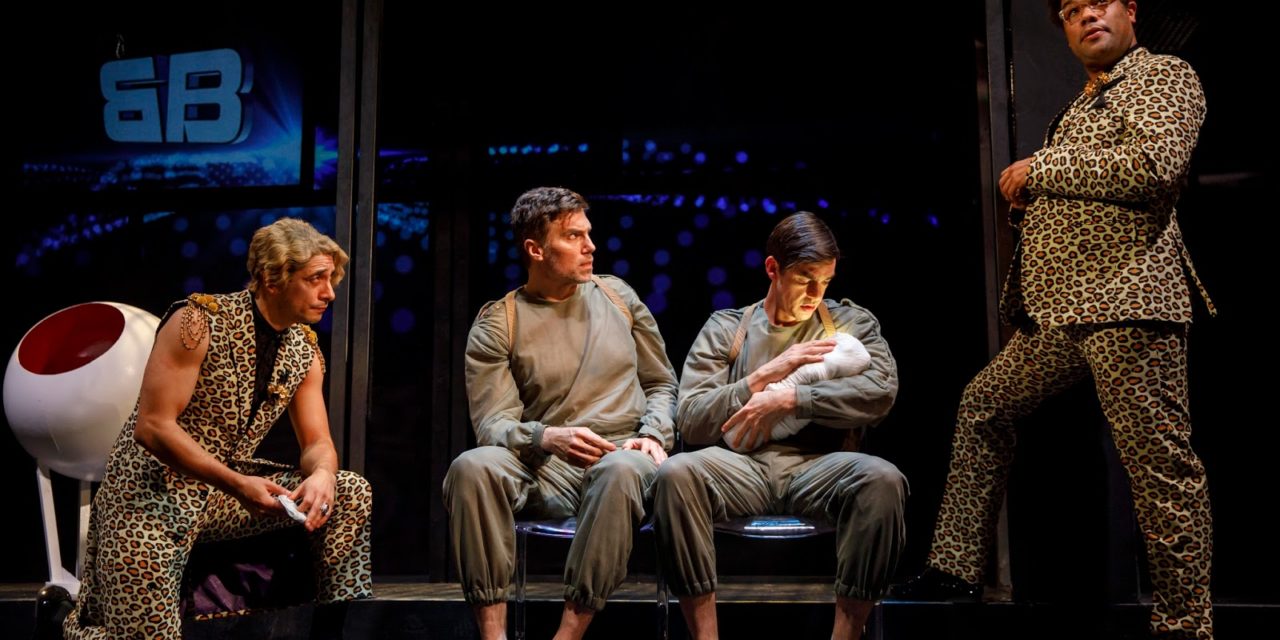I want the experience for the audience to be a sort of speeding train that gets completely and totally out of hand.
–Robert O’Hara (New York Times interview, Dec. 20, 2017)
Robert O’Hara’s Mankind, directed by the author at Playwrights Horizons, is a play desperately trying to get in trouble. It satirizes religion, men, feminism, social conservatism, and hookup culture, all with the same sassy irreverence. The trouble is, effective satire works through precision strikes, not cluster-bombing. The only sure way to get people good and outraged is to settle on a target and demonstrate that you know it better than its defenders.
You may have heard of this play’s basic premise, a sure attention-grabber in the #metoo moment. O’Hara’s futuristic society is devoid of women. For reasons never explained, they all died out 100 years earlier, but humanity survived because men developed the ability to bear children. O’Hara’s inspiration was Douglas Turner Ward’s cheeky 1965 satirical fantasy Day Of Absence, about whites coping with a world where blacks have suddenly disappeared. In Mankind, an all-male world copes with its repressed need to resurrect females.
In the first scene, two swaggering “bros,” Jason and Mark (Bobby Moreno and Anson Mount), introduced as casual “fuckmates,” not really in “a relationship,” bicker over a wee accident. “Dude, I’m pregnant.” “Dude, it’s probably not even mine.” “Dude, I could have not told you.” Displaying all the emotional intelligence of really dull 14-year-olds, they agree to “get rid of it.” The wrinkle: abortion is illegal in their vaguely authoritarian, socially conservative society.
After some bungling, they’re both arrested for attempted murder. The baby, born in prison, then turns out to be a girl (named “Cry-Baby,”) which is a big deal. It makes them “the most famous people on Earth,” and as newbie celebrities on TV (a scene both actors hilariously nail) they open their big shallow mouths to opine that there’s nothing wrong with recreational sex and that God for them is female. This sass makes them heroes, and then demigods, to a countercultural insurgency called Feminism.
That’s the setup, and when Cry-Baby dies—“It’s the AIR!!” (don’t ask)—events slide into wacky theatricality. Jason and Mark are broken out of jail and effectively re-imprisoned in a Temple, where they’re bedecked in extravagant, Ziegfeldesque getups. Clergymen in cardinal-red distribute bloody Cry-Baby fetishes and holy cards to the audience (only to the men, thank you) and lead them in prayer. It’s all a hoot, sort of. Feminism has become a religion, albeit without women, replete with gruesome idols, violent dogma, and fundamentalist extremists.
All this isn’t quite as clear in the play as I’m making it sound because everything is generously larded with non-sequiturs, tomfoolery, and petty distractions. For instance: “amen” in the Feminist church is intoned as “a-wo-men.” Discussions about parents don’t bother distinguishing between “fathers” and thus turn the word into Ionesco-like nonsense (everyone’s “father” might as well be Bobby Watson in The Bald Soprano—you know, the one with the same name as his cousin, son, father, uncle, and aunt). In a play at peace with being a confection, such indiscriminate whipped cream would be harmless and delightful. Plays that ask you to think hold fun to higher standards, though.
“Why?” I kept asking myself while watching Mankind, was I never properly delighted, or angry, or offended, or strongly moved in any other way? I think the reason is that the play, for all its insolence, isn’t a very sharp satire. It was a clever idea to send up liberal feminist pieties and mansplaining appropriation by comparing them to religion, but O’Hara’s skewering stalls on the level of sketch comedy. After the comic dust settles, he doesn’t seem to know very much about either feminism or parenting, and without those notes of empathy and understanding for his targets, his humor can’t touch us deeply. Nor can his politics ring true.
What has happened to gender—gendered behavior, gazes, presumptions, pressures—in the absence of women? Do children still contend with binaries as they grow? If so, do they amount to the old binaries, and if not, are there still attractions of opposites in other ways? O’Hara says nothing about these fundamental matters, and instead glosses the values of his reactionary world as a vague reflection of uptight middle America. Instead of considering how the new single-sex reality he posited would affect everything from family models to social and political structures to the very nature of ambition and desire, he borrowed a few hated features from his own, old world and set them up as a straw target.
You can’t even tell, through all the mock-Catholicism, whether the counter-cultural Feminist insurgency in Mankind really represents a true underclass that might be (or feel) differently gendered from the ruling class. Sometimes the movement comes across as a mere front for a testosterone-driven campaign to legitimize casual sex. That sort of murkiness is why Mankind couldn’t generate the scandal O’Hara wanted. It’s never wholly clear what track the speeding train is on, and what exactly people are supposed to get mad at.
This article was originally published on Jonathan Kalb (Something The Dust Said) on January 23, 2018 and has been reposted with permission.
This post was written by the author in their personal capacity.The opinions expressed in this article are the author’s own and do not reflect the view of The Theatre Times, their staff or collaborators.
This post was written by Jonathan Kalb.
The views expressed here belong to the author and do not necessarily reflect our views and opinions.


















